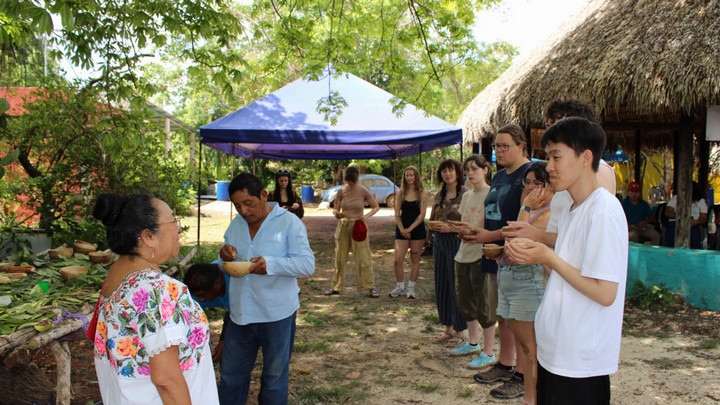Mexico Ethnographic Field School

Mexico Ethnographic Field School 2026
Based in: Maya Intercultural University of Quintana Roo (UIMQROO), Mexico
Dates: May 1st – May 22nd, 2026
Pre-Departure Workshops (4) at UVic in Spring 2026 (March dates TBC)
The field school will be based at the Maya Intercultural University of Quintana Roo (UIMQROO). Located in the Yucatán Peninsula, the UIMQRoo is among a network of a dozen higher education institutions in Mexico offering an indigenous-centred curriculum and bilingual Spanish / Mayan education. Learning from Indigenous communities abroad in an educational context like the UIMQROO represents a unique opportunity for UVic students to develop intercultural understanding and a greater appreciation for Indigenous worldviews. While exploring ethnographic methods, participants will discover some of the unique contemporary cultural practices and socio-economic dynamics that characterize contemporary Maya culture in the Yucatán Peninsula.
If you have missed our information sessions please view the slides here.
How to apply
APPLICATION DEADLINE: extended to December 1, 2025
To apply for this field school, please submit the following:
- The online Application Form
- The completed and signed Field School Waiver Form (by emailed to jindra@uvic.ca)
- Your current unofficial academic transcript (by email to jindra@uvic.ca)
Information for non-UVic students here.
For more information, contact Dr. Melissa Gauthier: meligau@uvic.ca
Additional information
The field school combines 2 courses for a total of 3 credits: Cultural Anthropology Field School Methods (ANTH 381) AND Cultural Anthropology Field School Regional Topics (ANTH 382).
Successful applicants will be registered in the two courses through special registration by the Department of Anthropology (students will not register themselves).
As part of ANTH 381, you will conduct small-scale ethnographic exercises to understand what is involved in conducting ethnographic fieldwork in a different cultural and linguistic context.
ANTH 382 will adopt an anthropological perspective in examining themes such as community health, agroecology, food sovereignty, tourism, street art. Students will learn about the importance of the emblematic milpa (a multi-cropping subsistence system), Maya healing practices and the revitalization of Maya stingless beekeeping with students and faculty of the Maya Intercultural University of Quintana Roo. Students will interact with a wide range of knowledge holders like herbalists, midwives, beekeepers, seed saving organizations and mural artists.
There will be several excursions to archaeological sites, cenotes and museums. We will visit the Caste War Museum in Tihosuco to learn about the history of the Caste War (1847–1901) and how it disrupted the social, economic, political, and physical landscape of the Yucatan peninsula for almost 60 years.
Students will stay two per cabaña with A/C and private bathroom.
Mexican, particularly Yucatecan food is delicious, and we will have the opportunity to eat different types of meals. Vegetarian dishes should be available most of the time. On rare occasions, full vegetarian meals may not be available. However, you will have other options such as rice, eggs, vegetables and fruit.
For field schools, students pay regular UVic tuition plus field school fees.
Field school fee: $3,600.
Field school fees include:
- accommodation for the duration of the field school
- Meals for the duration of the field school
- Transportation between locations
- Activity costs (entry admissions, local facilitators and guides)
- Compensation (and travel expenses) for guest lecturers and knowledge holders
Field school fees do not include:
- Tuition
- Airfare to and from Mexico
- Travel insurance
- Other expenses (souvenirs, free time, etc.)
Tuition for ANTH 381 and 382: Approximately $1,000 for Canadian students. See tuition fees for international students.
Airfare: Fares from Victoria to Yucatan are approximately $1,000 (return) though subject to change.
Dr. Mélissa Gauthier is a cultural anthropologist. She specializes in economic anthropology and border studies with particular attention to the intersections of culture and economy. As part of her work on urban livelihoods and informal economies, she has conducted extensive fieldwork with Mexican cross-border traders along the U.S.-Mexico border and the border between Mexico and Belize. Her teaching interests include economic anthropology, borders, migration, globalization, research methods, street economies in the Global South and consumption. Mélissa co-taught the Cuba Ethnographic Field School organized by the Department of Anthropology in Santiago de Cuba for two consecutive years.
Juan A. Castillo Cocom of the Universidad Intercultural Maya, Quintana Roo, Mexico, specializes in questions of ethnicity and Maya identity politics. His work problematizes the ways in which the identities of Maya peoples have been reduced by academic disciplines, political parties, and the tourist gaze. For more than three decades he has carried out ethnographic research in the states of Yucatán, Campeche, Quintana Roo and Chiapas.
Mélissa will translate meetings and workshops. However, students will have to cope with linguistic constraints outside of the field school program. We strongly encourage students to take a Spanish course before we travel.
- November 20, 2025 - Thursday: Application form submitted (online) and waiver forms returned to Department of Anthropology main office in Cornett B228 by 4:00pm. These forms will be available for download from the Department’s website on the field school page
- December 1, 2025, Monday: Applicants notified of acceptance by email.
- December 11, 2025, Thursday: 100$ deposit* due in the Anthropology main office Cornett B228 by 4:00pm
- January 15, 2026, Thursday: 1750$ payment* due in the Anthropology main office Cornett B228 by 4:00pm
- February 26, 2026, Thursday: Full balance of payment* (1750$) due in the Anthropology main office Cornett B228 by 4:00pm Note: *refundable only if the field school is cancelled
- March-2026: 4 mandatory workshops at UVic. Dates TBC. It is possible for students who are not in Victoria to join via zoom.
- May 1-22, 2026: Field school in Mexico
Note: Students who wish to stay in Mexico after the field school ends are responsible for their own accommodations, travel, health and safety.
Funding
Students travelling to field schools may be eligible for travel assistance. Learn about funding for field schools.
